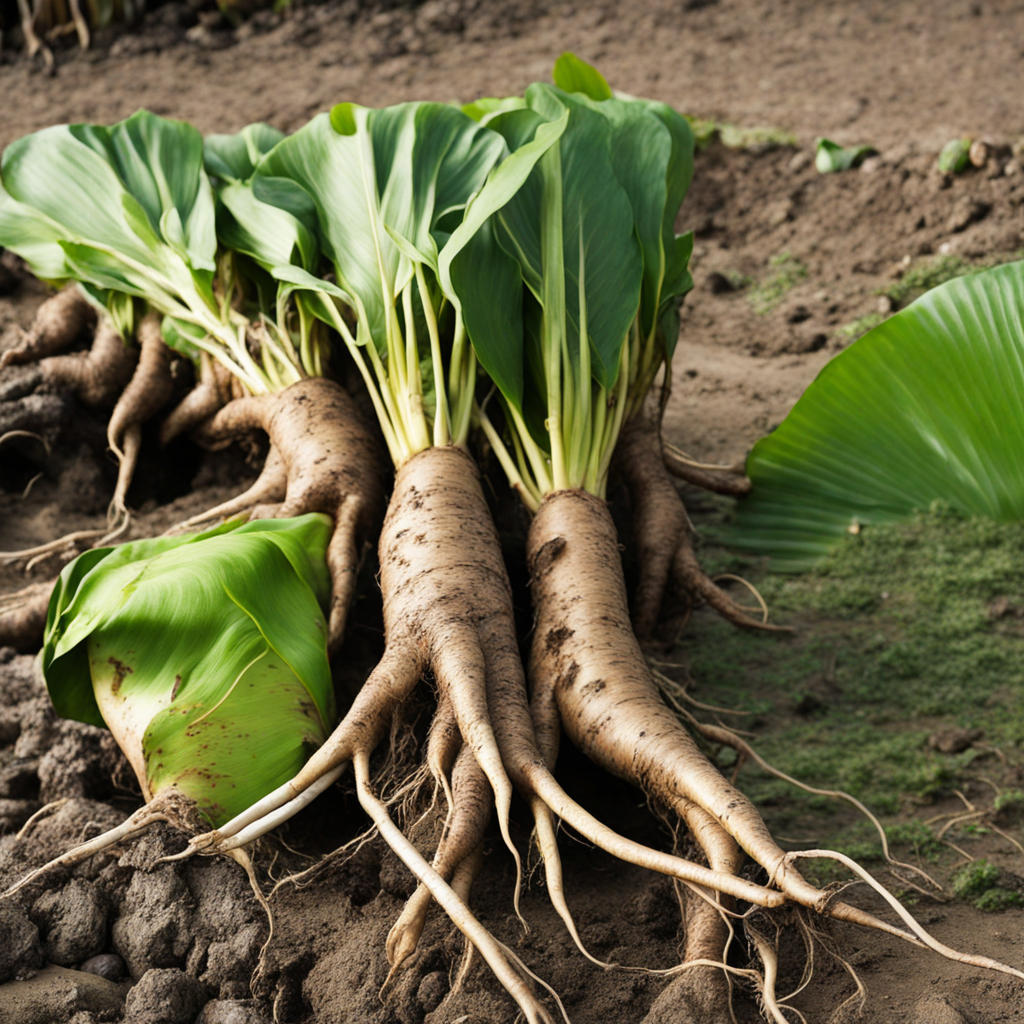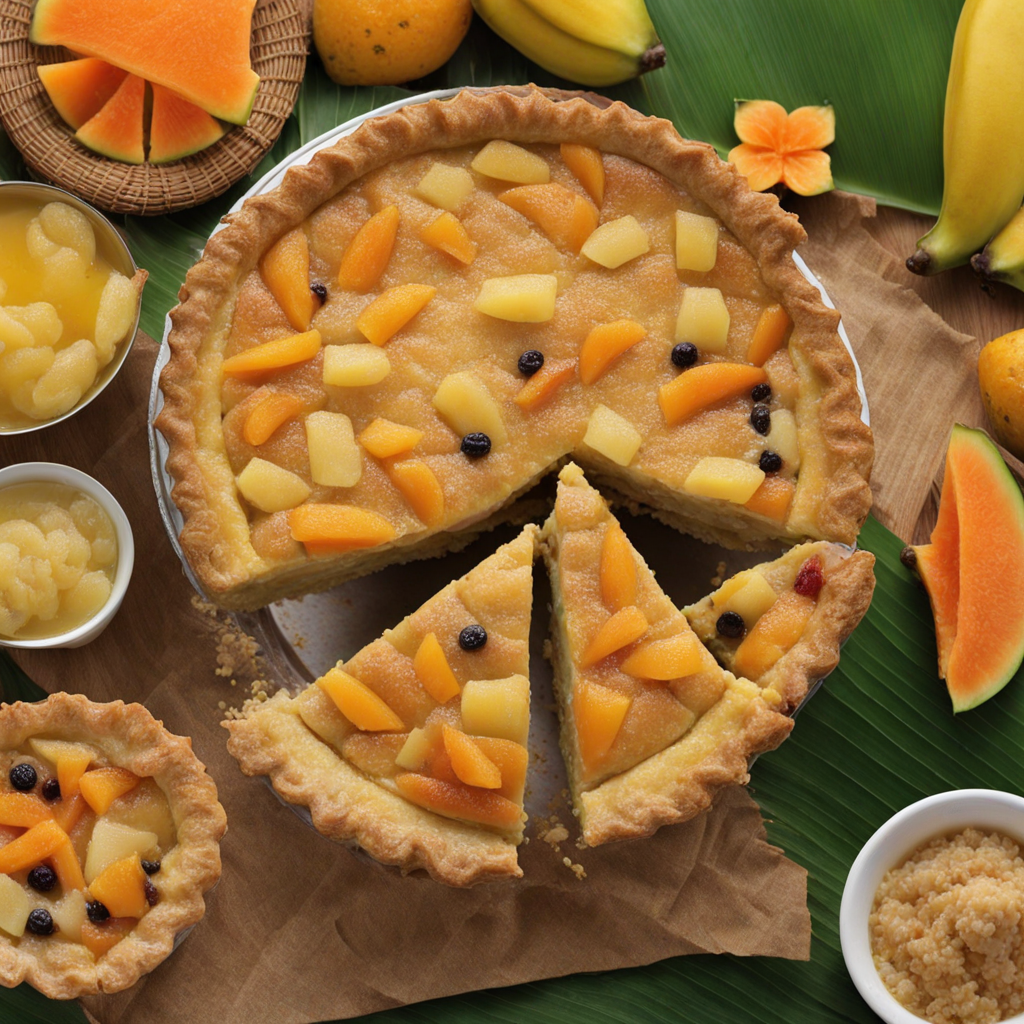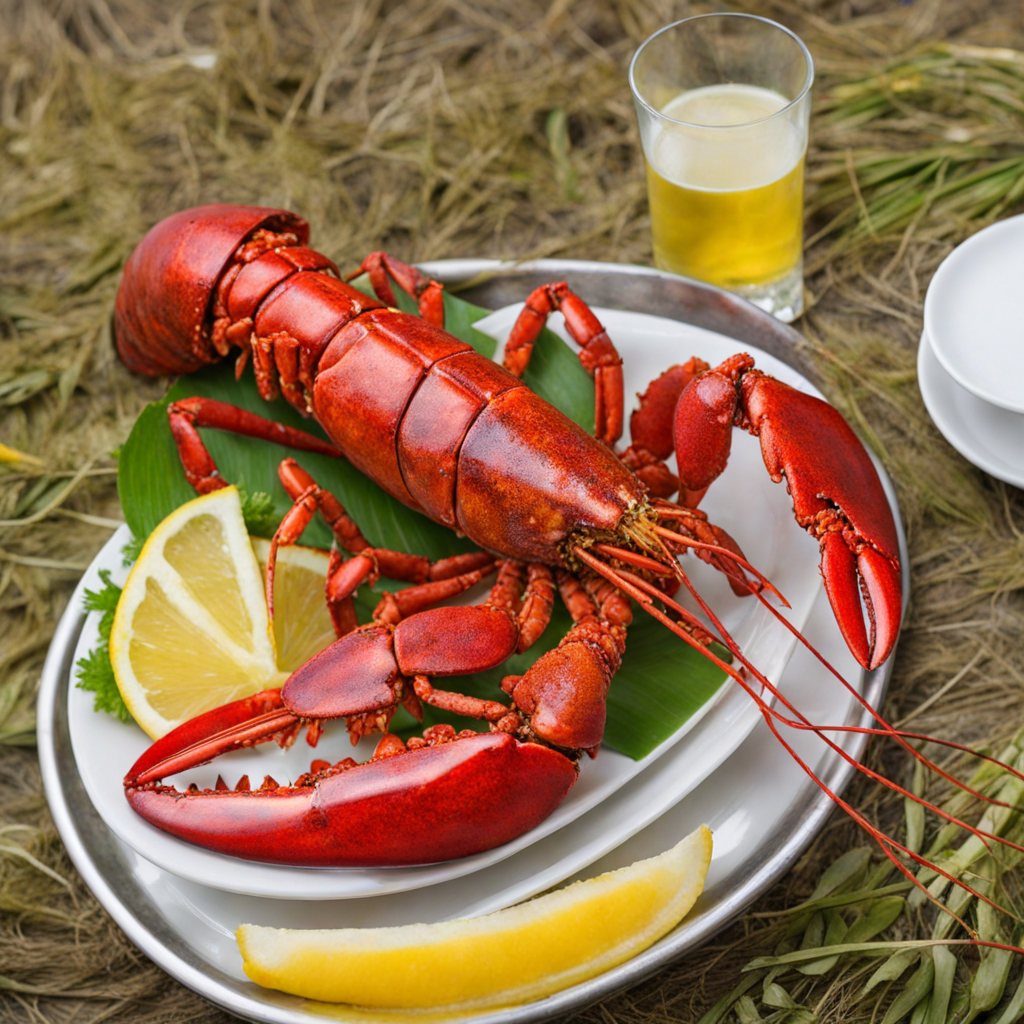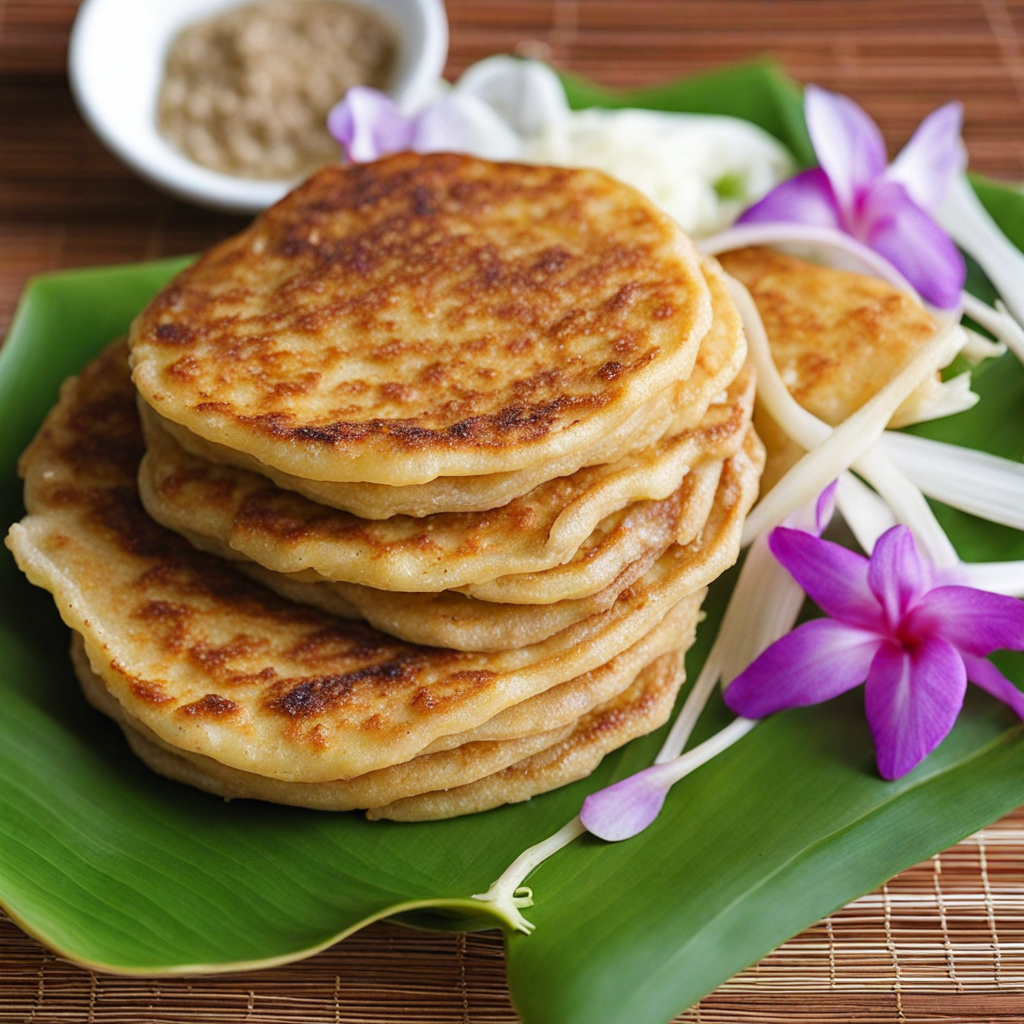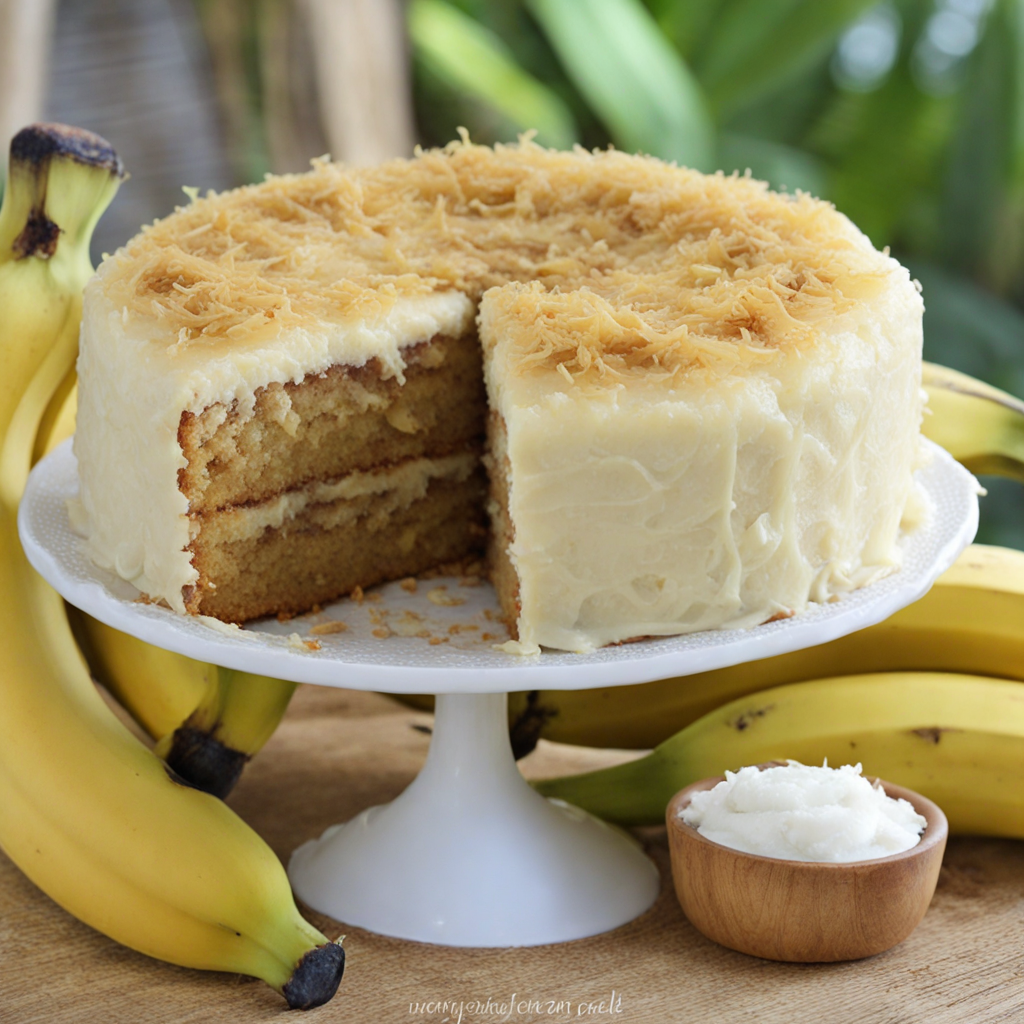Pulaka
Pulaka is a traditional dish from Tuvalu, made primarily from the starchy root of the pulaka plant, which is a type of taro. The preparation of pulaka involves harvesting the roots, which are then peeled, boiled, and mashed to create a creamy, dense texture that is both filling and satisfying. This unique tuber has a slightly nutty flavor, reminiscent of sweet potatoes, and is often enjoyed in various forms, whether as a side dish, a base for stews, or even incorporated into desserts. Pulaka embodies the essence of Tuvaluan cuisine, showcasing the local agricultural practices and the connection to the land. Traditionally, pulaka is cooked in an earth oven, a method that enhances its natural flavors. The cooking process involves wrapping the mashed pulaka in banana leaves and placing it in a pit lined with hot stones, allowing it to steam slowly. This method infuses the dish with a subtle smokiness and a hint of earthiness, creating a rich taste that pairs wonderfully with fresh fish, coconut-based sauces, or even local vegetables. The harmonious blend of flavors makes pulaka a staple and a beloved comfort food among Tuvaluans. In addition to its savory uses, pulaka can also be transformed into sweet treats, often mixed with coconut cream and sugar, then baked or steamed for a delightful dessert. This versatility highlights the adaptability of pulaka in the Tuvaluan diet, making it suitable for any meal of the day. Exploring pulaka offers a glimpse into the culinary traditions of Tuvalu, where food is not just sustenance but a celebration of culture and community.
How It Became This Dish
Pulaka: The Heartbeat of Tuvaluan Cuisine Pulaka, a starchy root vegetable native to the atolls of Tuvalu, stands as an emblem of the country’s rich cultural heritage and traditional food practices. This unique tuber, known scientifically as *Colocasia esculenta*, is commonly referred to as taro in many parts of the Pacific and has been cultivated in Tuvalu for centuries. The history of pulaka is deeply intertwined with the social, economic, and cultural fabric of Tuvalu, reflecting the resilience and adaptability of its people. Origin and Cultivation The origins of pulaka can be traced back to Southeast Asia, where it was first domesticated thousands of years ago. From these roots, it spread across the Pacific Islands, including Tuvalu. The cultivation of pulaka is particularly suited to Tuvaluan conditions, thriving in the region's warm tropical climate and the unique soil types found in low-lying atolls. Pulaka is typically grown in specially constructed pits known as "pulaka mounds" or "pulaka pits," which are filled with soil and often waterlogged to create a suitable environment for the plant. This method of cultivation showcases the ingenuity of Tuvaluan agriculture, as the atolls are characterized by limited arable land. The pulaka pits not only provide the necessary moisture for the plants but also help to conserve water, ensuring a sustainable food source for generations. The cultivation of pulaka is more than just a means of subsistence; it reflects the Tuvaluan understanding of their environment and their ability to work with the land and sea. The planting and harvesting of pulaka are communal activities, often involving families and extended communities, which fosters social bonds and reinforces cultural traditions. Cultural Significance Pulaka holds significant cultural importance in Tuvalu. It is often regarded as the "food of the gods," symbolizing sustenance and survival. Historically, it has played a crucial role in the diet of Tuvaluans, serving as a staple food that provides the necessary carbohydrates and energy for daily life. It is particularly revered during ceremonial occasions and feasts, where it is prepared in various ways, including steaming, boiling, and baking. In Tuvaluan culture, the preparation and sharing of pulaka embody the values of hospitality and community. Meals are often communal events, where families and friends gather to eat and celebrate together. The act of sharing pulaka signifies unity and connection among the people, reinforcing social bonds that are essential in the small island communities of Tuvalu. Pulaka is also woven into the fabric of Tuvaluan mythology and folklore. Stories often depict the significance of the plant in the lives of ancestors, emphasizing its role as a sustaining force. This cultural attachment to pulaka highlights the broader relationship between food and identity, where the consumption of traditional foods reinforces a sense of belonging and continuity in a rapidly changing world. Development Over Time As Tuvalu transitioned through various historical phases, including colonization and globalization, the role of pulaka evolved. During the colonial period in the late 19th and early 20th centuries, the introduction of new agricultural practices and crops altered traditional farming methods. While pulaka remained a staple, other crops such as coconuts and breadfruit began to gain prominence in Tuvaluan agriculture. The impact of global influences on Tuvaluan cuisine is notable, as imported foods became more accessible. Rice, canned goods, and processed foods began to infiltrate the local diet, leading to a gradual shift in eating habits. Despite these changes, pulaka has maintained its esteemed status, primarily due to its cultural significance and the efforts of local communities to preserve traditional agricultural practices. In recent years, there has been a resurgence of interest in traditional foods, driven by a growing awareness of health and sustainability. The Tuvaluan government and various non-governmental organizations have initiated programs aimed at promoting local agriculture, encouraging the cultivation of pulaka, and educating younger generations about the importance of traditional food systems. This movement reflects a broader global trend towards food sovereignty, where communities seek to reclaim control over their food sources and celebrate their culinary heritage. Moreover, the impact of climate change poses significant challenges to pulaka cultivation, as rising sea levels and changing weather patterns threaten the very lands where it is grown. Tuvalu, being one of the most vulnerable countries to climate change, faces the existential risk of losing its agricultural heritage. In response, there are ongoing efforts to adapt traditional farming techniques to enhance resilience, ensuring that pulaka remains a viable crop for future generations. Culinary Uses and Modern Adaptations In contemporary Tuvalu, pulaka is prepared in various traditional and innovative ways. It is commonly boiled and served with coconut cream, enhancing its natural sweetness and providing a rich, creamy texture. Pulaka can also be mashed, similar to potatoes, or used in soups and stews, showcasing its versatility as an ingredient. Creative culinary adaptations have emerged, with local chefs and home cooks experimenting with pulaka in modern dishes. Pulaka fritters, pulaka chips, and even pulaka flour for baking have gained popularity, merging traditional ingredients with contemporary cooking techniques. These innovations not only celebrate the heritage of pulaka but also cater to evolving tastes and dietary preferences, ensuring that this cherished food continues to thrive in Tuvaluan cuisine. Conclusion Pulaka is more than just a food source; it is a symbol of Tuvaluan identity and resilience. Its deep-rooted history, cultural significance, and adaptability reflect the spirit of the Tuvaluan people as they navigate the complexities of the modern world. As Tuvalu faces challenges posed by climate change and globalization, the preservation of pulaka and traditional agricultural practices will play a crucial role in maintaining cultural heritage and food security. In a world where food often serves as a bridge between past and present, pulaka stands as a testament to the enduring connection between the Tuvaluan people and their land. As they cultivate and share this remarkable tuber, they not only nourish their bodies but also uphold the traditions and values that define their unique cultural identity. Thus, pulaka remains a vital part of Tuvaluan life, a reminder of the strength and resilience found in the bonds of community and heritage.
You may like
Discover local flavors from Tuvalu


